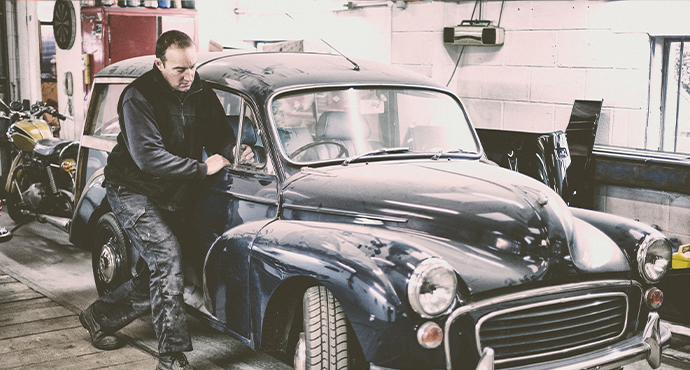Few things are scarier to think about as a collector than experiencing a total loss to your classic or collector car. Unfortunately, accidents happen, and even car collectors sometimes have to deal with a severe accident in which their car is totaled or nearly totaled.
After you’ve been in an accident, an insurance adjuster will come to survey the vehicle, assess the level of damage, and determine an estimate to repair your vehicle. Your insurance company will then decide based on the total loss laws of your state and the assessment by the adjuster whether or not to declare the vehicle a “total loss”.
In this post, we’ll take a look at the definition of “total loss”, as well as the total loss threshold by state, and review your options if you’ve been in an accident that has been determined to be a total loss.
What Is a Total Loss?
A total loss is defined by your insurance company when the value of a car is exceeded by the damage sustained in the accident. In other words, if the vehicle will cost more to repair than it is “worth” (subject to the total loss thresholds established in the particular state), it is declared a “total loss” by the insurance company. What the vehicle is “worth” depends on the definitions in your insurance policy contract. With auto insurance, two of the most common definitions of value are Agreed Value and Actual Cash Value.
The total loss thresholds vary significantly by state and affect how frequently a total loss is determined. Some states consider damages that exceed 50% or 75% of the car’s total value to meet the threshold criterial for a total loss, while other states require damages of 100% of the car’s value to constitute a total loss. Complicating the matter still, some states employ their own total loss formula (TLF) for calculating whether or not a car is totaled.
How Each State Determines a Total Loss
Depending on where you live, the determination for total loss will vary. Here’s a table summarizing each state’s total loss threshold.
| State | Total Loss Threshold | State | Total Loss Threshold | State | |
|---|---|---|---|---|---|
| Alabama | 75% | Louisiana | 75% | Ohio | Formula |
| Alaska | Formula | Maine | Formula | Oklahoma | 60% |
| Arizona | Formula | Maryland | 75% | Oregon | 80% |
| Arkansas | 70% | Massachusetts | Formula | Pennsylvania | Formula |
| California | Formula | Michigan | 75% | Rhode Island | Formula |
| Colorado | 100% | Minnesota | 70% | South Carolina | 75% |
| Connecticut | Formula | Mississippi | Formula | South Dakota | Formula |
| Delaware | Formula | Missouri | 80% | Tennessee | 75% |
| Florida | 80% | Montana | Formula | Texas | 100% |
| Georgia | Formula | Nebraska | 75% | Utah | Formula |
| Hawaii | Formula | Nevada | 65% | Vermont | Formula |
| Idaho | Formula | New Hampshire | 75% | Virginia | 75% |
| Illinois | Formula | New Jersey | Formula | Washington | Formula |
| Indiana | 70% | New Mexico | Formula | West Virginia | 75% |
| Iowa | 50% | New York | 75% | Wisconsin | 70% |
| Kansas | 75% | North Carolina | 75% | Wyoming | 75% |
| Kentucky | 75% | North Dakota | 75% |
As you can see, there’s quite a bit of variance from state to state when it comes to what qualifies as a total loss vehicle. A car that’s worth $20,000 and has damages of $15,000 (i.e., damages are 75% of value) would be considered a total loss in North Carolina, but still repairable in Colorado, where the damages must meet or exceed the worth of your car.
In states where a formula is applied, the insurance company’s claims adjuster determines with an estimate of damages and estimates the scrap (or salvage) value of the vehicle is added to that the loss estimate. If that number exceeds the vehicle’s total loss value threshold for the state, then the car is declared a total loss. Not at fault? It won’t make much of a difference since the fault of the accident isn’t considered when reaching a value determination.
What Happens After a Total Loss?
For most collectors in our hobby, the idea of experiencing a total loss would be heartbreaking. We know that the sentimental or historic value of a collector car may often exceed the vehicle’s cash value, so it is important to understand your options if/when a total loss does occur.
After the accident involving your collector car has been reported to your insurance company, your first step should be to meet with the insurance claims adjuster to go over the scope of the damages and the cost of repairs. It can be difficult to put a price tag on repairs for classic cars, since there’s no database of parts and costs like there are with modern cars. As such, the process usually requires some negotiation between the repairer and the insurer.
If your vehicle is determined to be a total loss, you can either: a) choose to accept the full claim settlement offer or b) choose to receive a reduced claim settlement AND retain the vehicle with a salvage title. If you accept the full claim settlement offer, you will need to sign over the title to the insurance company to allow them to dispose of the totaled vehicle as they see fit.
If instead, you choose to retain the salvaged vehicle, the insurance company will deduct the estimated vehicle salvage value from your total loss payment. In this case, you will be issued a salvage title of the vehicle and the insurance company will simply send you a check for the balance of the claim settlement amount. This option allows you to maintain ownership to and provides you with the flexibility to restore/repair/sell the vehicle how and whenever you see fit. Keep in mind that your ability to retain the salvage may not entirely be up to you if you have a lienholder on your title, since financing a car after total loss isn’t necessarily possible.
You’ll want to refer to your individual insurance company to clarify how the settlement value for a total loss is determined and to clarify the salvage retention process after a total loss. How claim payout value is determined if a total loss occurs differs greatly between specialty collector car insurance companies and traditional personal auto insurers.
Protect Your Passion with the Most Comprehensive Collector Car Insurance
At American Collectors Insurance, we know how much you value your classic or antique collector car. You invest a lot of time and money into enjoying it. So, select the right collector car insurance policy that fully protects your passion in the event of a total loss. Apply online and get a free classic car insurance quote in minutes.



